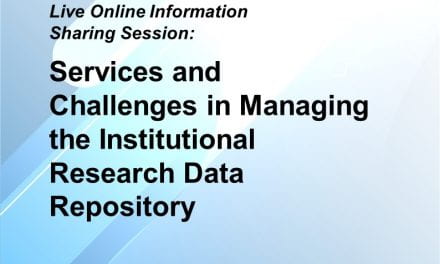We are happy to announce that DR-NTU (Data), NTU’s institutional open access data repository is now ready for all NTU researchers to deposit their research data!
Who can use DR-NTU (Data)?
DR-NTU (Data) is currently accepting research data from NTU researchers only.
What kind of research data should NTU researchers deposit in DR-NTU (Data)?
NTU researchers should deposit their final research datasets of their projects in DR-NTU (Data). Final research datasets consists of final versions of the data files that are produced after all analysis and manipulations.
What types of file format are accepted by DR-NTU (Data)?
DR-NTU (Data) can accept any file format.
Is there any file size limit?
Up to 3.5 GB for each single file upload via LAN connection to NTU network (subject to network conditions). There is currently no limit per dataset or per dataverse. Contact research data librarians to upload files bigger than 3.5 GB.
Do NTU researchers have to pay to use DR-NTU (Data)?
No, it is absolutely free for all NTU researchers!
How to upload datasets to DR-NTU (Data)?
Method 1: Do-It-Yourself
You can upload your research datasets directly to DR-NTU after creating an account using your NTU login. For more information, you can refer to the user guides for step-by-step instructions.
Method 2: Mediated deposit
We understand that first-time users may have many queries on the data deposit process. Fear not, we do provide a mediated deposit service. All you have to do is to contact the friendly research data librarians at NTU Libraries for help!
Why should NTU researchers use DR-NTU (Data)?
There are a couple of reasons why NTU researchers should consider using DR-NTU (Data):
- Compliance to funders’ and/or institution’s research data policy requirements
Many research funders and institutions worldwide are implementing data sharing requirements in their funding or institutional policies (e.g. Wellcome Trust, National Science Foundation (US), National Institutes of Health).
In NTU, research data are expected to be retained for at least 10 years. Furthermore, Principal Investigators (PIs) are required to deposit their final research data to the NTU Data Repository or external open access repository no later than the first online publication of the article (NTU Research Data Policy).
- No cost involved
Since DR-NTU (Data) is free, researchers can save their research funds from paying subscription fees to commercial research data repositories.
- Better guarantee of perpetuity
Other commercial or non-profit data repositories may shut down when lack of funding and they are not obligated ensure the long term preservation of deposited data.
- Reap the benefits of data sharing
Research has shown that data sharing has led to higher research visibility and citation rates (Gleditsch, Metelits & Strand, 2003; Piwowar, Day & Fridsma, 2007; Ioannidis et al., 2009; Pienta, Alter & Lyle, 2010; Henneken & Accomazzi, 2011; Sears, 2011; Dorch, 2012; Piwowar & Vision, 2017).
In addition, persistent identifiers (i.e. DOIs) and data citation will be generated for each dataset deposited successfully. The DOIs and data citations can encourage and help in data reuse and keeping track of data usage.
Any other interesting features of DR-NTU (Data)?
Sub-dataverses can be created by or for schools, research centres, project groups or individual researchers. What’s more, these sub-dataverses can be customized (themes, permissions, dataset templates, etc.) according to the needs of the group.
What’s next?
Apart from the regular DMP workshops, we would be lining up some workshops to highlight the features and let participants have a hand-on experience of using DR-NTU (Data). Please keep a lookout for the publicity emails and calls for registration!
Nevertheless, if you can’t wait to learn more about DR-NTU (Data), you can arrange for a consultation session with the research data librarians too!
Related Links:
• DR-NTU (Data) Policies
• DR-NTU (Data) FAQ
• Research Data Management Guide





